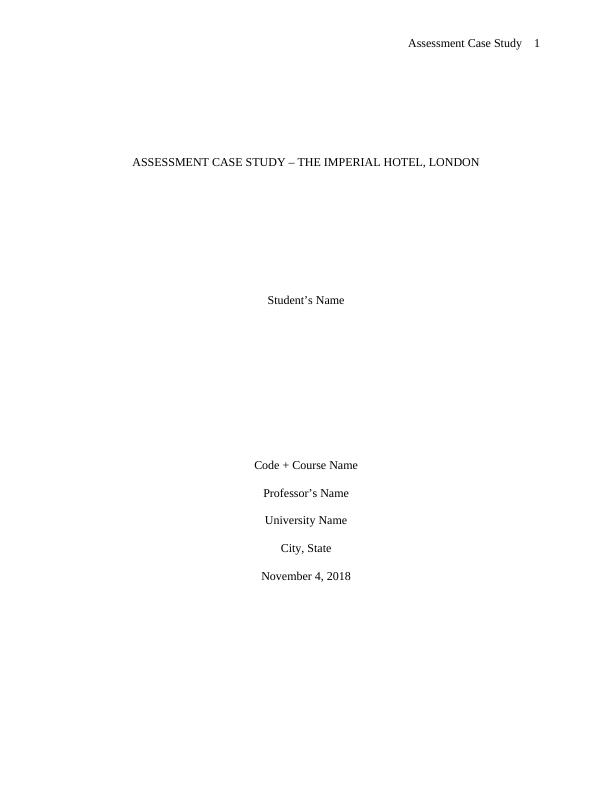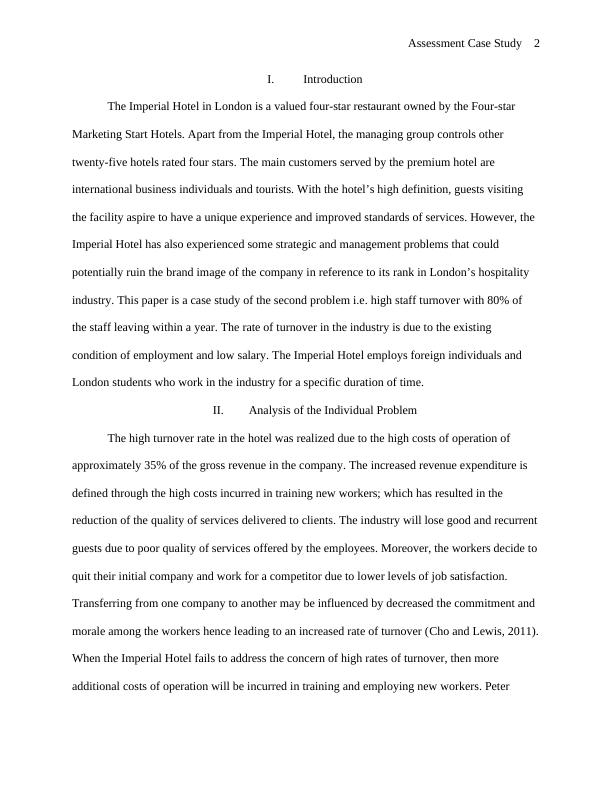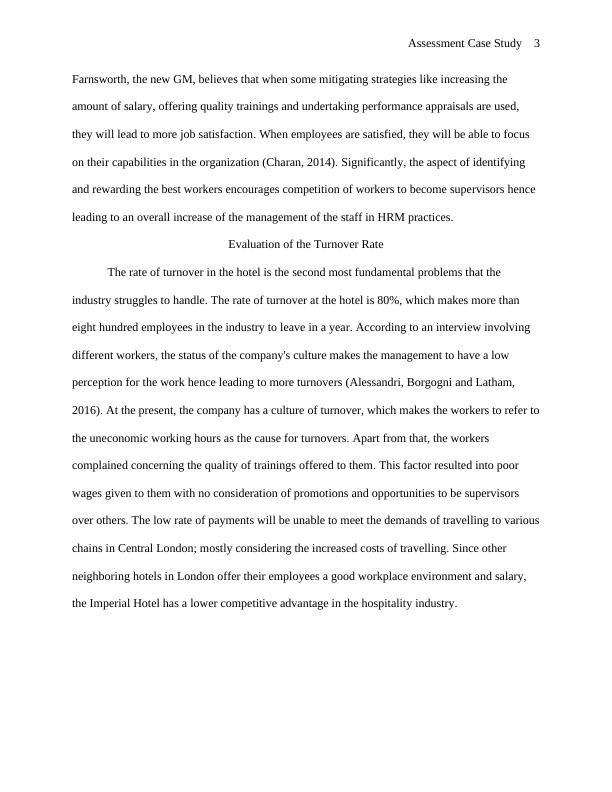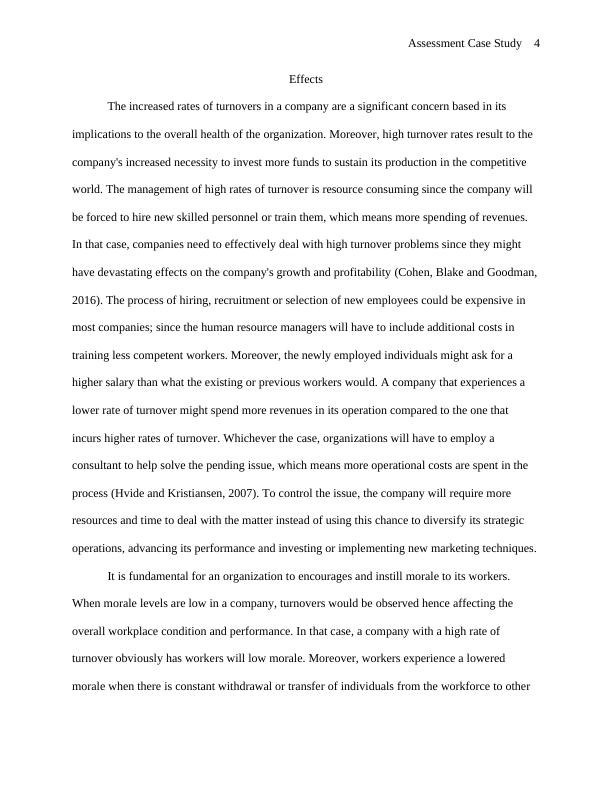Assessment Case Study - The Imperial Hotel, London
Added on 2023-06-03
12 Pages3257 Words277 Views
Assessment Case Study 1
ASSESSMENT CASE STUDY – THE IMPERIAL HOTEL, LONDON
Student’s Name
Code + Course Name
Professor’s Name
University Name
City, State
November 4, 2018
ASSESSMENT CASE STUDY – THE IMPERIAL HOTEL, LONDON
Student’s Name
Code + Course Name
Professor’s Name
University Name
City, State
November 4, 2018

Assessment Case Study 2
I. Introduction
The Imperial Hotel in London is a valued four-star restaurant owned by the Four-star
Marketing Start Hotels. Apart from the Imperial Hotel, the managing group controls other
twenty-five hotels rated four stars. The main customers served by the premium hotel are
international business individuals and tourists. With the hotel’s high definition, guests visiting
the facility aspire to have a unique experience and improved standards of services. However, the
Imperial Hotel has also experienced some strategic and management problems that could
potentially ruin the brand image of the company in reference to its rank in London’s hospitality
industry. This paper is a case study of the second problem i.e. high staff turnover with 80% of
the staff leaving within a year. The rate of turnover in the industry is due to the existing
condition of employment and low salary. The Imperial Hotel employs foreign individuals and
London students who work in the industry for a specific duration of time.
II. Analysis of the Individual Problem
The high turnover rate in the hotel was realized due to the high costs of operation of
approximately 35% of the gross revenue in the company. The increased revenue expenditure is
defined through the high costs incurred in training new workers; which has resulted in the
reduction of the quality of services delivered to clients. The industry will lose good and recurrent
guests due to poor quality of services offered by the employees. Moreover, the workers decide to
quit their initial company and work for a competitor due to lower levels of job satisfaction.
Transferring from one company to another may be influenced by decreased the commitment and
morale among the workers hence leading to an increased rate of turnover (Cho and Lewis, 2011).
When the Imperial Hotel fails to address the concern of high rates of turnover, then more
additional costs of operation will be incurred in training and employing new workers. Peter
I. Introduction
The Imperial Hotel in London is a valued four-star restaurant owned by the Four-star
Marketing Start Hotels. Apart from the Imperial Hotel, the managing group controls other
twenty-five hotels rated four stars. The main customers served by the premium hotel are
international business individuals and tourists. With the hotel’s high definition, guests visiting
the facility aspire to have a unique experience and improved standards of services. However, the
Imperial Hotel has also experienced some strategic and management problems that could
potentially ruin the brand image of the company in reference to its rank in London’s hospitality
industry. This paper is a case study of the second problem i.e. high staff turnover with 80% of
the staff leaving within a year. The rate of turnover in the industry is due to the existing
condition of employment and low salary. The Imperial Hotel employs foreign individuals and
London students who work in the industry for a specific duration of time.
II. Analysis of the Individual Problem
The high turnover rate in the hotel was realized due to the high costs of operation of
approximately 35% of the gross revenue in the company. The increased revenue expenditure is
defined through the high costs incurred in training new workers; which has resulted in the
reduction of the quality of services delivered to clients. The industry will lose good and recurrent
guests due to poor quality of services offered by the employees. Moreover, the workers decide to
quit their initial company and work for a competitor due to lower levels of job satisfaction.
Transferring from one company to another may be influenced by decreased the commitment and
morale among the workers hence leading to an increased rate of turnover (Cho and Lewis, 2011).
When the Imperial Hotel fails to address the concern of high rates of turnover, then more
additional costs of operation will be incurred in training and employing new workers. Peter

Assessment Case Study 3
Farnsworth, the new GM, believes that when some mitigating strategies like increasing the
amount of salary, offering quality trainings and undertaking performance appraisals are used,
they will lead to more job satisfaction. When employees are satisfied, they will be able to focus
on their capabilities in the organization (Charan, 2014). Significantly, the aspect of identifying
and rewarding the best workers encourages competition of workers to become supervisors hence
leading to an overall increase of the management of the staff in HRM practices.
Evaluation of the Turnover Rate
The rate of turnover in the hotel is the second most fundamental problems that the
industry struggles to handle. The rate of turnover at the hotel is 80%, which makes more than
eight hundred employees in the industry to leave in a year. According to an interview involving
different workers, the status of the company's culture makes the management to have a low
perception for the work hence leading to more turnovers (Alessandri, Borgogni and Latham,
2016). At the present, the company has a culture of turnover, which makes the workers to refer to
the uneconomic working hours as the cause for turnovers. Apart from that, the workers
complained concerning the quality of trainings offered to them. This factor resulted into poor
wages given to them with no consideration of promotions and opportunities to be supervisors
over others. The low rate of payments will be unable to meet the demands of travelling to various
chains in Central London; mostly considering the increased costs of travelling. Since other
neighboring hotels in London offer their employees a good workplace environment and salary,
the Imperial Hotel has a lower competitive advantage in the hospitality industry.
Farnsworth, the new GM, believes that when some mitigating strategies like increasing the
amount of salary, offering quality trainings and undertaking performance appraisals are used,
they will lead to more job satisfaction. When employees are satisfied, they will be able to focus
on their capabilities in the organization (Charan, 2014). Significantly, the aspect of identifying
and rewarding the best workers encourages competition of workers to become supervisors hence
leading to an overall increase of the management of the staff in HRM practices.
Evaluation of the Turnover Rate
The rate of turnover in the hotel is the second most fundamental problems that the
industry struggles to handle. The rate of turnover at the hotel is 80%, which makes more than
eight hundred employees in the industry to leave in a year. According to an interview involving
different workers, the status of the company's culture makes the management to have a low
perception for the work hence leading to more turnovers (Alessandri, Borgogni and Latham,
2016). At the present, the company has a culture of turnover, which makes the workers to refer to
the uneconomic working hours as the cause for turnovers. Apart from that, the workers
complained concerning the quality of trainings offered to them. This factor resulted into poor
wages given to them with no consideration of promotions and opportunities to be supervisors
over others. The low rate of payments will be unable to meet the demands of travelling to various
chains in Central London; mostly considering the increased costs of travelling. Since other
neighboring hotels in London offer their employees a good workplace environment and salary,
the Imperial Hotel has a lower competitive advantage in the hospitality industry.

Assessment Case Study 4
Effects
The increased rates of turnovers in a company are a significant concern based in its
implications to the overall health of the organization. Moreover, high turnover rates result to the
company's increased necessity to invest more funds to sustain its production in the competitive
world. The management of high rates of turnover is resource consuming since the company will
be forced to hire new skilled personnel or train them, which means more spending of revenues.
In that case, companies need to effectively deal with high turnover problems since they might
have devastating effects on the company's growth and profitability (Cohen, Blake and Goodman,
2016). The process of hiring, recruitment or selection of new employees could be expensive in
most companies; since the human resource managers will have to include additional costs in
training less competent workers. Moreover, the newly employed individuals might ask for a
higher salary than what the existing or previous workers would. A company that experiences a
lower rate of turnover might spend more revenues in its operation compared to the one that
incurs higher rates of turnover. Whichever the case, organizations will have to employ a
consultant to help solve the pending issue, which means more operational costs are spent in the
process (Hvide and Kristiansen, 2007). To control the issue, the company will require more
resources and time to deal with the matter instead of using this chance to diversify its strategic
operations, advancing its performance and investing or implementing new marketing techniques.
It is fundamental for an organization to encourages and instill morale to its workers.
When morale levels are low in a company, turnovers would be observed hence affecting the
overall workplace condition and performance. In that case, a company with a high rate of
turnover obviously has workers will low morale. Moreover, workers experience a lowered
morale when there is constant withdrawal or transfer of individuals from the workforce to other
Effects
The increased rates of turnovers in a company are a significant concern based in its
implications to the overall health of the organization. Moreover, high turnover rates result to the
company's increased necessity to invest more funds to sustain its production in the competitive
world. The management of high rates of turnover is resource consuming since the company will
be forced to hire new skilled personnel or train them, which means more spending of revenues.
In that case, companies need to effectively deal with high turnover problems since they might
have devastating effects on the company's growth and profitability (Cohen, Blake and Goodman,
2016). The process of hiring, recruitment or selection of new employees could be expensive in
most companies; since the human resource managers will have to include additional costs in
training less competent workers. Moreover, the newly employed individuals might ask for a
higher salary than what the existing or previous workers would. A company that experiences a
lower rate of turnover might spend more revenues in its operation compared to the one that
incurs higher rates of turnover. Whichever the case, organizations will have to employ a
consultant to help solve the pending issue, which means more operational costs are spent in the
process (Hvide and Kristiansen, 2007). To control the issue, the company will require more
resources and time to deal with the matter instead of using this chance to diversify its strategic
operations, advancing its performance and investing or implementing new marketing techniques.
It is fundamental for an organization to encourages and instill morale to its workers.
When morale levels are low in a company, turnovers would be observed hence affecting the
overall workplace condition and performance. In that case, a company with a high rate of
turnover obviously has workers will low morale. Moreover, workers experience a lowered
morale when there is constant withdrawal or transfer of individuals from the workforce to other

End of preview
Want to access all the pages? Upload your documents or become a member.
Related Documents
High Employe Turnover at the Imperial Hotellg...
|10
|2798
|292
Management Operation In A Corporationlg...
|11
|3172
|118
Introduction to Management: Imperial Hotellg...
|10
|2597
|344
Problem Solving Strategies - PDFlg...
|11
|2934
|94
Assignment on Management Theories (Doc)lg...
|8
|2510
|82
Management Assignment - IMPERIAL HOTEL CASElg...
|9
|2777
|281
